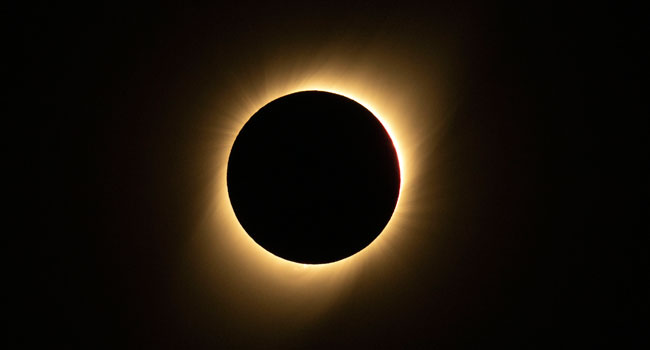Whether or not they will be in the path of totality, millions of Americans consider the solar eclipse to be an event they cannot miss. What does that mean, though, for all of our animal friends?
The American Veterinary Medical Association’s president, Dr. Rena Carlson, witnessed firsthand how animals reacted to the 2017 complete eclipse.
Her Pocatello, Idaho, veterinarian clinic closed for a few minutes so that employees and several of their dogs could view the eclipse outside.
“Honestly, the animals were probably more anxious because of our excitement than anything else,” she recalls.
Although some dogs might show some of their typical behaviors when it becomes dark outdoors, according to Carlson, there is unlikely to be a big impact from the eclipse on pets.
However, factors like traffic and crowds can, which is why veterinarians advise against bringing pets outside for safety. According to Carlson, there are precautions that their humans should take to keep an eye out for them on a busy day like this, particularly if someone is traveling.
Whether your pet is waiting for you at home or in the middle of the action, here are some expert tips for keeping them safe during the eclipse:
First, consider whether your pet even needs to come with you for outdoor eclipse viewing. If it’s close to home, this will help you make plans ahead of time. “My bigger worry is there was so much traffic and so many people coming through our area that a drive [that] typically would take us two hours took over eight to ten hours,” Carlson says.
“It’s quite an amazing phenomenon for us to experience,” she explains. “And so that can be pretty stressful when dogs are with large crowds and a lot of noise, they don’t quite understand the excitement. They’re going to be much more nervous about ‘What’s going on?’ and ‘How should I react?’ ”
She says the same guidance applies to all pets, even though cats and birds are not as likely to be traveling in the first place.
“They’re going to be better off at home, in their normal environment,” she adds.
Prepare for commotion and contingencies if you’re traveling
If you do decide to bring your dog, plan ahead for what to do if things get overwhelming.
That includes bringing extra food and water in case the journey takes longer than expected, and getting them out of the car for walks or bathroom breaks if you’re stuck in traffic.
Carlson advises “always being thinking about” how to ensure your pet’s safety and comfort once you’ve arrived at your location. Observe their body language, keep them on a leash, and make sure they’re drinking enough water.
“You know your pets’ behaviors better than anybody else,” she continues. “And so watch for any kind of a change in how they’re reacting.”
Panting, pacing, and wailing are examples of distress signals. Carlson says to take your pet out of the situation right away if you see any of these behaviors because “the more worked up they become, the harder it is to calm them down.”
“I know there’s a lot of activity going on and there’s a lot of things to see, and excitement,” she continues. However, if you have … a pet with you, make sure you’re really paying attention to them and watching their signs of stress so that you can respond appropriately.”
If you are going on a trip without your dogs, make sure you have a contact back home who can take care of feeding and walking them while you are away, particularly if you think you might return later than usual.
While you’re away, the ASPCA advises keeping pets occupied with a food puzzle toy or another type of enrichment. The day you leave your pet alone shouldn’t cause you any more anxiety than normal, according to Carlson.
“They’re not going to be worried about the eclipse happening,” she continues. “They’re just going to think it’s a normal day where you’re gone.”
Avoid wasting your eclipse glasses on your pet
Pets do not require special sunglasses for viewing the eclipse, unless there are a few brief moments when the moon completely blocks the sun. “They’re outside every day and don’t look up at the sun, so there’s no reason to think they’re going to do that at this point,” says Carlson. In fact, attempting to put glasses on your pet, even for a picture opportunity, may cause more harm than good. Stressed-out dogs may paw them off or even chew them up.
“Keep the glasses for yourself, because we’re the ones that are going to be looking up at the sun and need that protection for our eyes,” she continues. “They’re just going to be looking around like they normally do every day and feeding off of your emotions and your excitement.”
Even while it’s uncommon that animals will stare directly at the sun, if they do so for an extended period of time, their eyes could get harmed, according to Dr. Lori Bierbrier, senior medical director of ASPCA Community Medicine, who spoke with NPR via email.
Squinting, covering one eye or pawing at the eyes, redness, inflammation, or cloudiness, and discharge or watering of the eyes are signs of ocular injury. She suggests calling your veterinarian as soon as you become aware of them.
Concerned pet owners should ideally call their veterinarian to explain the situation and receive advice beforehand. However, Carlson points out that this is just one example of why strong client-patient relationships are so important: “Whether there’s an eclipse or not,” she says, “emergencies happen.” What about vet offices that are closed for the eclipse, as Carlson’s briefly was, or difficult to get to on the day of the eclipse? Carlson says you should be aware of heavy traffic and figure out back roads you can take.

